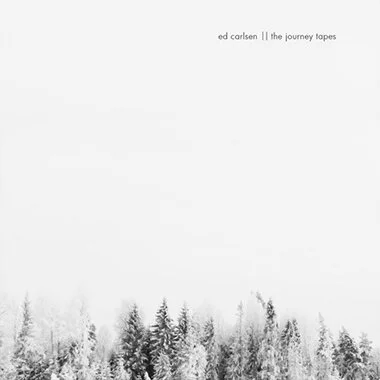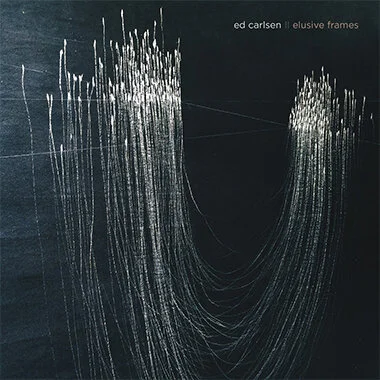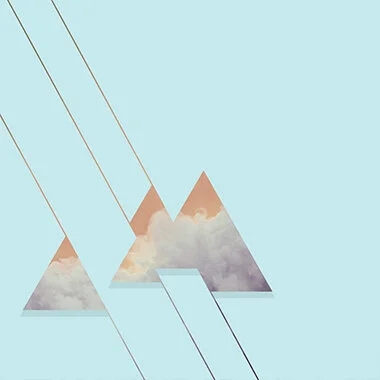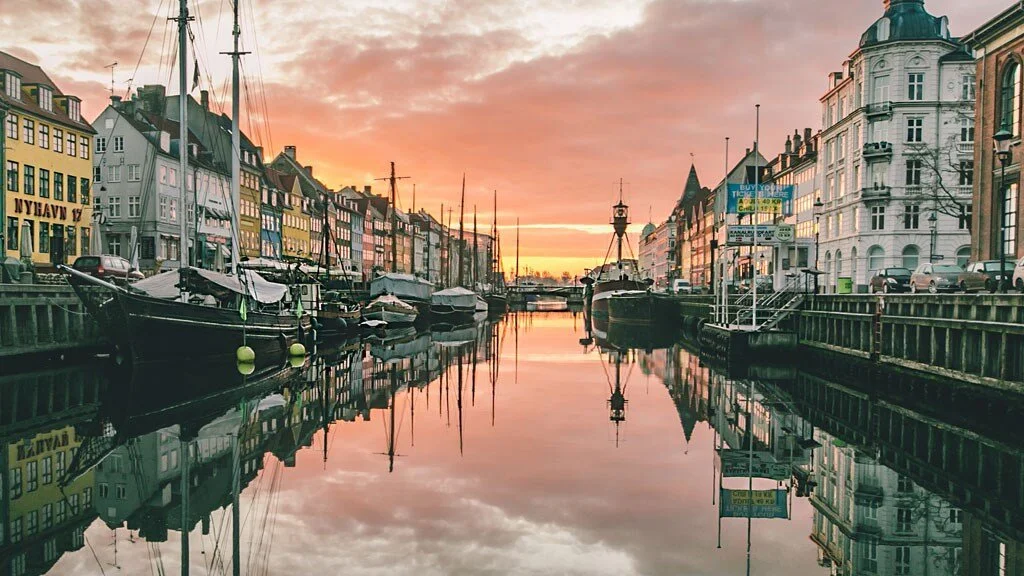
ED CARLSEN
AT NIGHT WHEN THE SEA IS STRONG AND IT IS COLD OUTSIDE, I WOULD LOOK OUT OF MY WINDOW AND WATCH THE SHIPS GO BACK AND FORTH.
The Journey Tapes, Ed Carlsen (2016)
Elusive Frames, Ed Carlsen (2017)
Morning Hour, Ed Carlsen (2019)
Do you go to a certain place or do you create an atmospher be able to write music?
There are some beautiful places where I would enjoy making or playing music. In a way architecture is important for my workflow because I want my environment to be in a certain way. For starters, I need the studio to be very clean and tidy. When I’m sitting down making music, the atmosphere needs to be visually appealable. Also the general atmosphere of the city I live in influences my music and is a real inspiration to me. I’m not specifically talking about the looks of a city, but more about its people, its culture... My own Italian culture hasn’t penetrated my music almost at all. There are some great artists who embrace it much more than me, like Ludovico Einaudi and others. I felt more attracted to the Nordic countries, where it is a little colder, to get inspired to work on a certain type of music. I don’t see Italy in my music yet but since I’m moving back there I might. I’m planning on making it very cosy and nice. The vibe is key, and sometimes a glass of wine would do as well.
If you’ve got to choose, do you have a favourite place?
I have two favourite places for different reasons. One of them is Denmark. More specifically the place where I used to live, in the middle of nature right outside of Copenhagen. There was a lake that made me always feel at peace. The other one is my hometown in Sardinia where I’m originally from. They are each other's opposites and therefore complementary. One is rather dark and the other rather sunny. One is quiet and the other is not so much. One has great food and the other is trying hard. Although… Copenhagen used to be the city with the most Michelin-starred restaurants. Now I think about it, there is actually a third place that doesn’t exist. I wouldn’t know how to call or describe this place and if it’s something I’ve ever seen before… but it’s a place I normally dream of. It has some elements of my hometown but it is way more Mediterranean. Good and bad things happen in there, which is why this place is real to me. Every time I wake up from it, I wish I could be there again.
How do you start working on a new album or a new project? Do you reflect on certain themes? If so, enlighten me what gives you the inspiration to write.
My working method varies from time to time. It could either be that I just sit down and come up with an idea, because of a certain trigger, that inspires me to make new music. Or it could be that I first come up with a specific concept like I did for my first album “The Journey Tapes” where there is a certain narrative throughout. The songs are called Close, Cage, Grey, Rain, Loose and Far. It is structured in such a way that the first and last song are opposites such as Cage and Loose. The first two songs are about youth. I wanted to play a more childlike melody whereas Loose and Far are more mature and thoughtful. Grey and Rain are faster and yet sad, like a teenager who’s struggling with a lot of things in life. The narrative is still there even without words because the music is in charge of explaining what is going on in a person’s journey through life.
The second album doesn’t really have a concept although it was inspired by the time I was in London. My house was on a hill, 100 feet high, which allowed me to overlook the city. From the kitchen window, I could see all the way down to southern London. I would wash dishes and think what would be going on with all these people. These situations that were going on behind their windows were like elusive frames to me. You see them but don’t really see them, yet they are there.
Have you ever or would you be able to transpose the feeling of a place into music?
This question comes at the right time. There is in fact one song on my next album which is called “Home”. It’s a very specific place that for each and every other individual is different. I wrote it last month when I went back to Denmark for a few days and sat down at what used to be my old piano, in my old living room. It inspired me to make a song about being home and to think what this specific environment meant and felt like to me.
To me, like I said before, the place I’m in also manifests itself in my music and is really crucial. The first album was written and recorded in London, the second one in Denmark and the third one between Krakow and Cagliari (Italy). As a musician I evolve throughout my career and my sound changes throughout the years. The first album has a lot of sounds that remind me of emotions and things I gathered in London. The second one is a little more Nordic, a bit more dark. And the third one, heading south, is in a way more upbeat.
Can you tell us a bit more about a building or urban setting that is extremely important to you for the fact that it frames inspiration or feels like home?
Overall I get really inspired by brutal architecture because it’s were you can find the real urbanism. I love places where slangs come from as they influence the development of your own language, as well as new trends and fashion.
To answer your second question, there is a harbour in northern Copenhagen, Nyhavn, which feels like home to me. It is a rather industrial-looking area and nowadays it is becoming a very fancy ‘hipster’ place to live like. I often think back of this harbour during winter. At night when the sea is strong and it is cold outside, I would look out of my window and watch the ships go back and forth. The second album has its cover in dark blue which is exactly the colour I have in mind for this place. It’s a dark sky reflected in dark waters.
Nyhavn, Copenhagen ©Thomas Høyrup Christensen
There is a strong connection between an image and music as the example you just cited shows. We can imagine that an image gets stronger by the music that accompanies it, but when you take away the music the image can get a complete different feeling. The music on the other hand can keep its initial atmosphere without the image. Do you believe that there is music where the images or scenes are so relevant that the music loses its power without it?
If something is made on purpose for a specific type of media, then the two are supposed to get along perfectly. But I think you can still keep the music separated from the visuals, because after all you can compensate with imagination. It is up to your own imagination to make up a setting or story within the music. I often make batches of 15 pieces of music between 2 and 3 minutes each. The clients trust my instinct and afterwards they’ll place some visuals to this music. It is quite challenging because I never worked like this before. You don’t really know where to start, but it is a nice concept. The music somehow already made sense to me before being linked to specific images.
I once read that if you don’t feel like making music, you shouldn’t be making it. That only if you have desire to make music, there will be a result. Do you believe that the mindset to write should be one of desire to write in order to be able to make sincere work?
There is no way I can force myself to write a song. I always try to make sure I have something to tell. When making music, I need to have the drive and the enthusiasm to do so, because otherwise it doesn’t make sense at all to me. Otherwise it would feel like pleasing someone else, but I need to be happy with it first. The music I make has to be as sincere and real as possible and it is influenced a lot by the relationship I have with humans. The concept of “The Journey Tapes” is pretty much about my whole life and the people who have had a role in it. The inspiration I get from humans, either good or bad, influence the music I’m making. I need to go through certain emotions to finally express them through music. Some people say that I’m not exactly the type of person they were expecting from listening to the music I make. To me, that doesn’t mean that I’m not being sincere. On the contrary, I’m still on a journey, looking and searching for the person I want to be. Listen to my music if you want to know what my ideal state of mind is. You’ll get to know the person I’m aiming for.
How does music gives meaning to life?
Music gives meaning to my life in terms of personal satisfaction because it is what I want to do most. It also helps me express the things I can’t say in real life sometimes. I’d rather translate my emotions into music to reflect on it and reach out to other people. Therefore it is also absolutely essential that people listen to my music and that I have an audience. People’s appreciation means a whole lot to me because it means that I’m doing something meaningful. I also love taking pictures and I often have this urge to post them on social media. It is not because I’m cocky or arrogant but I want to share my art with an audience that has an interest for it. When I myself listen to other people’s music I get inspired, which means that it has an effect on me as a listener and not as a musician specifically.
I see the present as a combination of fascination with the past and enthusiasm for the future. The love for knowledge that is already there and the excitement for what may yet happen to it. If so how would this reflect in your work and in the process of writing music?
This is exactly the idea that I have of music. It is about loving and acknowledging what’s already been done. By knowing and understanding this, it is possible to make it yours and create something that is of value for the future. Although I try not to follow traditions too much, I can’t deny that they’re still part of me. There is no way I can forget the past and lose my admiration for it. There are some elements of Mediterranean music for example that provides some harmonic or melodic solutions that I’m not necessarily fond of. This doesn’t mean I have to push it away from me, but rather embrace it and make it my own in a different way.
It sometimes seems that the drive for innovation has equated the concept of beauty with the past. I don't think that's correct. Is beauty an aspect that attracts you to the process of creation and the final result? Is the search for beauty a relevant parameter in your work?
It would probably take a whole book to explain what beauty is and what is to be considered beautiful music. To me it depends on how you want to achieve it. The way how I strive for beauty in my music is by having a very researched kind of sound. I want to achieve beauty by not leaving anything to chance. For instance, take any of my songs and try to imagine them as being played on a grand piano. Everything will sound less meaningful, because they would not sound in a way I intended them to. That’s to me a way of researching beauty, by making bespoke and specific sounds that are more functional to what I am trying to achieve or express.
Do you feel that there is a lot of serendipity in your process of writing music?
Yes, a lot actually. I can only plan as far as concepts go, but I never plan the rhythm, the key, the mood… These things need to fall into place at the right time. Ideas are floating somewhere and you just need to be in the right mood and mindset to make them come to life. When I dream, I often dream of beautiful music and when I’m awake I try so hard to remember it, but I always fail. You just need to wait to make it emerge again.
Nature has a great impact on the serendipity of my music. It is full of sounds that inspire us musicians to create. In 1913 an Italian musician Luigi Russolo wrote “The Art of Noises”, a futuristic sound manifesto. He argued that we are getting everyday more accustomed to the sounds that are surrounding us. And that could be considered as the orchestra of the future. I try to emulate the sound of the wind with synthesizers, for instance. I do this by playing with filter cutoff and resonance, which indeed creates the *sound of the wind*. I try to do that with the sea as well. I made a song called “Rain” where you can hear the rain pouring all the time throughout the song. All the sounds I hear in nature are potentially a sound that could be sampled to create a piece of music on its own.
When recording we are aware of the fact that sound gets infinite because it is immortalised on tape. Is it therefore hard to make decisions in what to keep and what to let go?
I understand the fact that music will always be there and if you don’t make the right decision it can ruin your career forever. But I think I’m very quick in this process of making decisions. My quality with music is to acknowledge what works and what doesn’t, what is predictable and what is not. I would never praise myself for my playing skills because I’m not real a pianist, I cannot impress you by playing the piano, but I’m very quick in making a selection on what to keep and what to let go.
As architecture's main goal is to shelter people, what do you think is the main goal for music?
My main goal is to inspire others to be more empathic with the rest of the world. Architecture is more of a real thing, which you can touch and see with your own eyes, whereas music is something more abstract.
One can say creating a song is like designing a building. It's putting notes into chords, chords who create harmony (or disharmony in some cases), searching for the right sequence, rhythm, tone. One could almost say a musician is an architect of notes. What are your thought on this matter?
It is in fact pretty much the way you described it. Building up a song is comparable with sketching. I come up with a melody and I need to build the harmony although it doesn’t come that easy and automatically to my fingers or my head because I’m not trained to do that. I’m self-taught when it comes to everything except production, as that’s what I’ve been studying. I need a bearing structure with floors and pillars and a roof. When I know it is strong enough, I start arranging and decorating the whole thing. I really see the association between a musician and an architect in this kind of way. The choice of a sound is like choosing the fabric or choosing the type of material, the colour of a brick. A piano can sound in a thousand different ways, so you have to design and craft your own signature sound.



